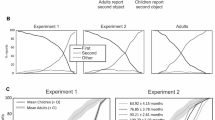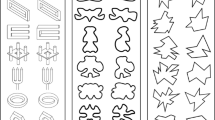Abstract
In two related studies, a pictorial sorting task served as the means of measuring conceptual development in LD and normal boys. The studies found no differences in the bases on which groups were formed (perceptible attributes, function, or nominal class membership) or in the manner in which groups were structured (thematically, in complexive groups or superordinate groups). Furthermore, parallel developmental trends were found in both LD and normal subjects groups. These findings are not consistent with early studies of concept formation in brain-damaged subjects, most of whom were retarded. Subjects in the present studies were selected on the basis of clinical diagnosis of LD and average IQ. The findings of the present studies suggest that generalizations about conceptual abilities of LD children of normal intelligence should not be based on early studies of the effects of brain damage.
Similar content being viewed by others
References
Bruner, J. S., Olver, R. R., & Greenfield, P. M. (Eds.).Studies in cognitive growth. New York: Wiley, 1966.
Bryan, T. H., & Bryan, J. H.Understanding learning disabilities (2nd ed.). Sherman Oaks, California: Alfred, 1978.
Denny, D. Developmental changes in concept utilization among normal and retarded children.Developmental Psychology, 1915,11, 359–368.
Goldman, A. E., & Levine, M. A developmental study of object sorting.Child Development, 1963,34, 649–666.
Kuhlmann-Hollenberg, C. Functions of visual imagery in learning and concept formation of children.Child Development, 1910,41, 1003–1015.
Neimark, E., Slotnick, N. S., & Ulrich, T. Development of memorization strategies.Developmental Psychology, 1971,5, 427–432.
Olver, R. R.A developmental study of cognitive equivalence. Unpublished doctoral dissertation, Radcliffe College, 1961.
Olver, R. R., & Hornsby, J. R. On equivalence. In J. S., Bruner, R. R. Olver, & P. M. GreenfieldStudies in cognitive growth. New York: Wiley, 1966.
Peller, M.Classification strategies and language development: A word-sort study. Unpublished doctoral dissertation, Yeshiva University, 1974.
Rigney, J. C.A developmental study of cognitive equivalence transformations and their use in the acquisition and processing of information. Unpublished senior thesis, Radcliffe College, Harvard University, 1962.
Ross, A.Psychological aspects of reading and learning disabilities. New York: McGraw-Hill, 1976.
Sigel, I. Developmental trends in the abstraction ability of children.Child Development, 1953,24, 131–144.
Author information
Authors and Affiliations
Rights and permissions
About this article
Cite this article
Fleischner, J.E., Danzig, M. Conceptual development in learning-disabled and normal boys. J Abnorm Child Psychol 8, 83–92 (1980). https://doi.org/10.1007/BF00918163
Issue Date:
DOI: https://doi.org/10.1007/BF00918163




